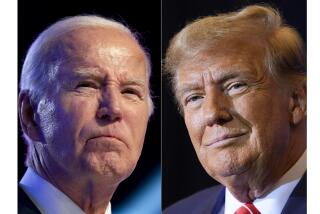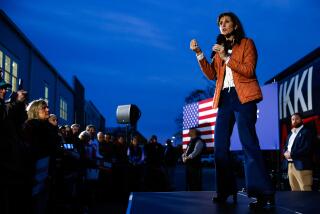Huntsman struggles to get campaign rolling in New Hampshire
The way his advisors framed it, Jon Huntsman Jr. was going to be the next big thing in the Republican presidential field: a smooth, motorcycle-riding westerner who ditched high school to play in his band and ultimately made good in a career as a business executive, governor and multilingual diplomat.
But a month after his rocky launch, there is no visible surge for Huntsman in the crucial state of New Hampshire, where he is mired in low single digits in the polls and drawing small crowds.
Instead he has weathered the resignation of his first campaign manager, embarrassing errors like the misspelling of his name in his first mailer and reports of squabbles within his ranks, which marred his effort to start a vigorous new phase of his campaign this week.
As he toured New Hampshire this week, it was clear that Huntsman had piqued the interest of some independents and Republicans. But many voters said they had heard little about him — or asked who he was. And though Huntsman tried to more aggressively draw contrasts with his rivals after initially emphasizing civility, he often seemed uncomfortable doing so — leading reporters to repeatedly ask him to clarify which unnamed rival he was talking about.
Perhaps the biggest problem for the former Utah governor is that voters like Brian Albertelli of Rochester — who wants to see a full-fledged battle with President Obama next year — just can’t get past Huntsman’s most recent job.
“He worked in the Obama administration as an ambassador to China — so almost off the top, that kind of knocks him off for me,” said Albertelli, who listened to Huntsman’s talk at a fundraiser for local Republicans in Rochester this week.
Huntsman has cast his role with the administration as patriotic service to country, but Albertelli said he was bothered by the candidate’s comments since leaving the administration that “Barack Obama’s a good guy, he’s all right, he’s not that bad.”
“I completely disagree with that,” Albertelli said. “And if somebody thinks that what [Obama] is doing is OK, even a little bit, then I’m going to completely write them off.”
Huntsman and his advisors are taking the long view of the race, arguing that current poll numbers reflect voters’ inattention during the summer months and the fact that he is little-known — which they are trying to change, with 21 staffers in the Granite State and plans for Huntsman to campaign intensively here through the fall, with side trips to Florida and South Carolina.
“This is exactly where we expected to be; we’ve only been in the race for a month and a half — you spend a lot of time on the ground, you develop a message that is consistent with where you stand on the issues, and you build it over time. This isn’t retooling,” Huntsman said.
Some Huntsman admirers say there’s an advantage to his low profile. For now, his rivals are trying to chip away at Mitt Romney’s front-runner status, which Huntsman backers believe will create an opportunity to position himself as the most viable Romney alternative in New Hampshire.
“He has a conservative record, which Mitt Romney does not,” Huntsman advisor John Weaver said, adding of Romney: “We are going to outwork him; we are going to outhustle him.”
When questioned about his progress this week, Huntsman often cited the example of 2008 Republican presidential nominee John McCain, who came from behind to win in both the 2000 and 2008 New Hampshire Republican primaries.
Weaver, who guided Sen. McCain’s 2000 campaign, says that around this time in 1999, George W. Bush far outdistanced McCain in the polls: “Through hard work … we were able to grind it out,” he said.
But several other McCain advisors rejected the parallel. They noted that as a Navy veteran, McCain had a built-in bloc of voters in military-heavy New Hampshire; he also had a national profile as a maverick and had roamed so many miles in the state that people joked he was running for governor.
A number of political operatives questioned the efficacy of having so many staffers in New Hampshire at this early juncture.
“At some point that has to start translating into movement on the ground and signs that [Huntsman] is building a volunteer organization,” said Mike Dennehy, a New Hampshire-based consultant who was part of McCain’s core team in 2000 and 2008. “If he doesn’t start announcing some high-level supporters, county chairs and town chairs, then he very well may not be able to recover.”
As Huntsman hustled through the state this week, from house parties to business tours to a stroll down Manchester’s Elm Street with ice cream in hand, the visit was enough to get voters like Sue Winters looking at his resume. When she met him during his tour of a factory, Winters told the candidate she loved that he was “a rebel without a cause,” and dropped out of high school before “getting back in the game.”
“Look where he is now…. It proves people can have second chances,” she said.
On Elm Street he won the promise of votes from least three people — one was from Rhode Island, one was from Massachusetts and one was a Democrat, making them unhelpful in the primary here. He banged out the Charlie Brown theme song on a keyboard at a downtown music store.
During a house party in Exeter, he told a crowded house that he’d win New Hampshire — in no small part because he could connect with all the state’s motorcycle enthusiasts. In Rochester, Albertelli let Huntsman take a spin on his Harley. After thundering off for a brief escape from the campaign trail, a windblown Huntsman circled back into the driveway, where Albertelli complimented his handling of the bike.
But after the candidate pulled away in his SUV, Albertelli said those skills weren’t going to make a bit of difference in his vote.
More to Read
Start your day right
Sign up for Essential California for news, features and recommendations from the L.A. Times and beyond in your inbox six days a week.
You may occasionally receive promotional content from the Los Angeles Times.







